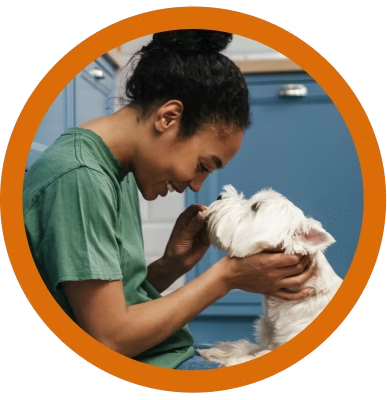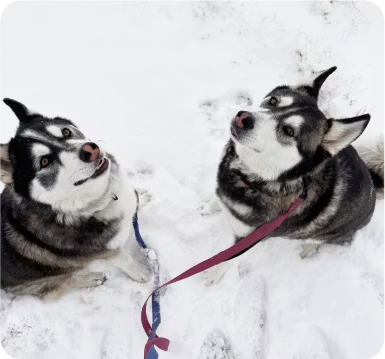5 million pets, 5 million stories, one amazing community
Wisdom Panel has officially tested 5 million pets—and with every DNA test, we’ve uncovered incredible stories, surprising discoveries, and deeper connections between pets and their people. Here’s what we’ve built together.


Inside the mind (and heart) of a pet parent
We already knew pet parents are obsessed (in the best way), but we wanted to dig deeper. So we asked over 10,000 of them just how much their pets influence their lives. Spoiler: A lot. Here’s what they had to say.
Pet parents bring their A-game
From birthday parties to wills, pet parents take caring for their pets to a whole new level. After all, pets are family—and they’re treated like it!

Fur babies
81% of pet parents consider their pet their child.

The more the merrier
41% of pet parents have at least 3 pets or more in their household.

In the will
25% of pet parents have included their pet in their will.

Adoption leads the way
78% of pet parents adopted their pet from a shelter or rescue.

Cake, treats, repeat
92% of pet parents celebrate their pet’s birthday (because every good boy and girl deserves a party!).

Party animals
36% of pet parents have thrown their pet a party.
Pets are the ultimate +1
When it comes to love, pets get the final say! From choosing cuddles over couples to letting their pets play matchmaker, pet parents know who their real soulmates are.

Pets over romance
65% of pet parents would rather have a pet over a partner

Must love pets
20% say their pet has influenced who they date.

Pet approval required
83% of pet parents say a pet’s disapproval would likely influence their relationship decisions.
Home is where the pet is
Pets shape our lives—and our addresses. From choosing pet-friendly homes to planning vacations and careers around their companions, pet parents make sure their furry friends come first.

Pet first, address second
61% of pet parents say their pet influences where they live.

Pawsport ready
67% of pet parents have taken their pet on vacation (why should humans have all the fun?).

Sorry, I have plans… with my pet
85% of pet parents have canceled plans just to stay home with their pet.

Pet-friendly jobs for the win
45% of pet parents have chosen a job based on pet-friendly perks
Pets make the best sounding boards
Pets are the best listeners—no judgment, just love! From dinner debates to life updates, pet parents share it all—because their pets always understand.

Our furry confidants
97% of pet parents talk to their pet like they’re a person.

Pets just get us
99% believe their pet understands their emotions.

Conversations with pets
Pet parents commonly talk to their pets about dinner plans, TV, the weather, and family members.
Pets deserve to be pampered
Spoiled? Absolutely. Deserved? No question. From endless nicknames to top-tier comforts, pet parents go all out to give their pets the VIP treatment.

of pet parents have over 5+ nicknames for their pet (because one is never enough!).

of pet parents spend at least $1,000 per year on pet care

of pet parents have purchased high-tech gadgets for their pets (think GPS collars or cameras)

of pet parents have invested in heated or orthopedic pet mattresses
Pet parents go all out
We asked, "What’s the most extravagant thing you’ve bought for your pet? The answers did not disappoint:

A house (yes, a whole house!)

A first-class airline ticket because luxury only

An RV for road-tripping with their bestie

A personalized pet portrait
Every test tells a tale
Behind every Wisdom Panel DNA test is a story. From long-lost siblings reuniting to genetic insights that shape care, our pet parent community continues to show us just how powerful DNA insights can be. Here are a few of their incredible stories.

Sister, sister
When Zoey was rescued and placed in foster care, the goal was to help her feel safe. What she found was so much more. She slowly bonded with her foster family’s dog, Jazz, and their friendship blossomed. But after officially adopting Zoey and running a Wisdom Panel DNA test, the family discovered an incredible twist—Zoey and Jazz weren’t just best friends, they were long-lost sisters. Adopted from different shelters 2.5 years apart, they were finally where they were meant to be—together.

A life-saving discovery
A trip to the emergency vet is always stressful, but for Duke, it could have been catastrophic. After an injury, he was rushed to the ER, where the vet was ready to administer pain medication—until Duke’s family spoke up. Thanks to his Wisdom Panel DNA test, they knew he had a genetic mutation that prevents him from processing certain drugs, including the one he was about to be given. By sharing this information, they helped Duke avoid what could have been a fatal reaction.

From stray to family
Sophie was found on the interstate, abandoned, scared, and injured. When no one came to claim her at the shelter, her rescuers knew they had to adopt her. Since they had no background information on Sophie, a Wisdom Panel DNA test filled in a lot of blanks for her new pet parents. She's 65% American Pit Bull Terrier, with other breeds from the Guard dog breed group mixed in. So it's no wonder that she's a loyal, devoted member of her new family.
Discover your pet’s unique story
Every test reveals a tale. Learn about your pet’s breed mix, genetic health, behavior, traits, and more.
